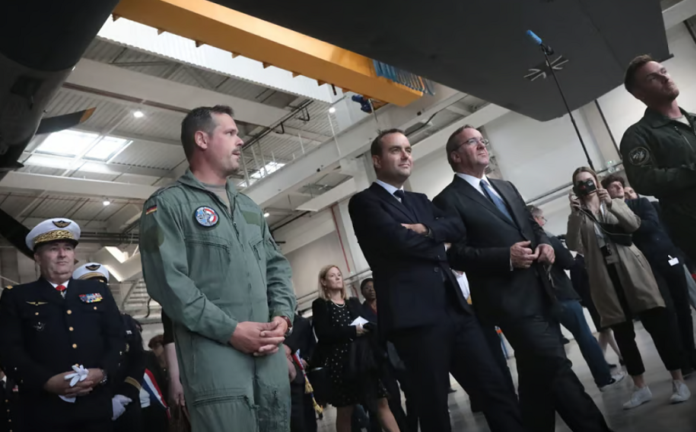Germany and France pledged on Thursday to move their joint next-generation battle tank forward by the end of the year, according to Politico.
French Armed Forces Minister Sébastien Lecornu and his German counterpart Boris Pistorius met at the Évreux-Fauville Air Base — where a joint Franco-German tactical airlift squadron has been located since 2021 — to give new political impetus to the Main Ground Combat System (MGCS) after years of delays.
“The pace was slowed down and now we’re speeding up,” Pistorius told reporters after the meeting. By the end of this year, Paris and Berlin will define the different pillars and the leading country for each of them, he said: “Next year, I hope we’ll get to the decisive stage of signing the contract, which may allow others to join the project.”
Both ministers declined to provide details on the pillars.
The MGCS was launched in 2017 by French President Emmanuel Macron and then-German Chancellor Angela Merkel as a symbol of defense and industrial cooperation between their two countries. The project goes hand in hand with another one to build a Franco-German fighter jet — the Future Combat Air System (FCAS). Germany leads the MGCS and France leads the FCAS.
France’s Nexter, the maker of its Leclerc tank, and Germany’s Krauss-Maffei Wegmann (KMW), which makes Leopard 2 tanks — now merged into a single company called KNDS — were initially the leading defense companies in charge. In 2019, Germany’s Rheinmetall was added to the mix, contributing to delays as Paris and Berlin had to find a new balance of power with two German companies instead of one.
While Paris and Berlin are at loggerheads on many issues including air defense, trade and nuclear energy, both ministers were keen to showcase unity amid comments suggesting that the Leopard 2’s battlefield performance in Ukraine — leading to new orders piling up — means the MGCS is no longer a priority for German industry.
Thursday’s bilateral discussion is part of an ongoing political push: Lecornu was in Berlin in July to meet with Pistorius and will travel to the German capital on October 9 and 10. Both ministers will speak monthly to keep the project moving.
After the meeting, the French and German land army chiefs signed a so-called High Level Common Operational Requirements Document (HLCORD) — a key step before an actual specifications for the main battle tank. “Key expectations are starting to emerge,” Lecornu said.
While the initial timetable was somewhere between 2035 and 2040, Lecornu told reporters on Thursday the project „will take us to 2040, 2045.”
The MGCS aims to replace the Leclerc and Leopard 2, but the French minister touted it as much more than a tank. It’s “a system of different manned and unmanned modules,” laser technology and drones, he said. Artificial intelligence is also expected to play a key role for information-gathering, coordination and command support, as well as resistance to cyberattacks and readiness for electromagnetic warfare.
Italy and the Netherlands have expressed interest in the project, both ministers said, adding that Paris and Berlin would need to agree on the MGCS’s requirements first before other capitals can join.


